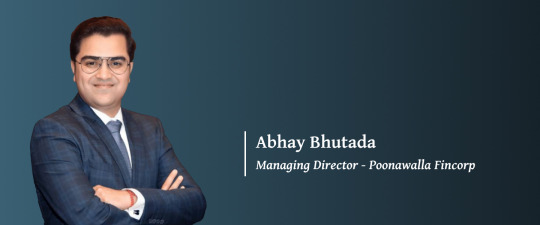#finance sector
Text
Exploring the Digital Frontier: 10 Key Strategies to Revolutionize Finance in 2024

In today's rapidly evolving financial landscape, the fusion of technology and finance has become essential for prosperity. As we delve deeper into 2024, the digital transformation of finance offers unprecedented opportunities for efficiency and expansion.
Poonawalla Fincorp: Pioneering the Fintech Revolution through Digitalization
At the forefront of this revolution stands Poonawalla Fincorp, led by the visionary Abhay Bhutada, MD of the Fintech. With a robust risk management framework and cutting-edge collection infrastructure, Poonawalla Fincorp epitomizes the synergy between traditional financial expertise and digital prowess.
By embracing emerging technologies such as artificial intelligence (AI) and machine learning, Poonawalla Fincorp aims to optimize processes, mitigate risks, and enhance overall efficiency. This strategic vision, with Abhay Bhutada, aligned with Adar Poonawalla's ethos of innovation, positions the company at the forefront of the digital transformation sweeping through the financial sector.

The Imperatives of Financial Digitization in 2024
To successfully navigate the digital frontier and revolutionize financial operations in 2024, businesses must embrace strategic imperatives that encapsulate the essence of digital innovation and resilience. Here are ten essential strategies to guide organizations towards sustainable growth and competitiveness:
1. Embrace Cloud-Based Accounting Solutions
Cloud technology has redefined financial management, offering real-time tracking, automated invoicing, and seamless expense management. Platforms like QuickBooks Online and Xero provide accessibility across devices, fostering collaboration and integration with essential business tools.
Also Read: Meet Abhay Bhutada: The Winner Of Lokmat Maharashtrian Of The Year 2024
2. Harness the Power of AI-Powered Analytics
Artificial intelligence empowers organizations to extract deeper insights from vast datasets, enabling informed decision-making and predictive analytics. Tools like IBM Watson Analytics facilitate trend identification and market prediction, driving strategic initiatives.
3. Explore the Potential of Blockchain Technology
Beyond cryptocurrencies, blockchain technology enhances security and transparency in financial transactions. Leveraging blockchain-based solutions streamlines operations, minimizes fraud risks, and fosters trust among stakeholders.
4. Transition to Digital Payment Solutions
Digital payment methods offer unparalleled convenience and speed, aligning with evolving consumer preferences. Integrating payment gateways like PayPal and Stripe enhances transaction efficiency and elevates customer experience.
Also Read: Unveiling the Top Chartered Accountants in India and Their Staggering Net Worth
5. Automate Routine Financial Tasks
Robotic process automation streamlines financial processes, reducing manual intervention and minimizing errors. Automation of tasks such as invoice processing and payroll management enhances productivity and enables resource allocation to strategic endeavors.
6. Prioritize Cybersecurity Measures
With digital transactions come heightened cybersecurity risks. Implementing robust security protocols, including multi-factor authentication and encryption, safeguards sensitive financial data against cyber threats.
7. Tap into Digital Lending Platforms
Digital lending platforms provide expedited access to financing solutions, circumventing traditional bureaucratic hurdles. Peer-to-peer lending and crowdfunding platforms offer faster approval times and cater to diverse funding needs.
8. Embrace Mobile Banking Services
Mobile banking applications offer on-the-go access to financial services, enhancing convenience and customer satisfaction. Intuitive interfaces facilitate functions such as account management and fund transfers, fostering loyalty and engagement.
9. Leverage Robo-Advisors for Investment Management
Robo-advisors offer cost-effective investment management solutions, delivering personalized advice and continuous portfolio monitoring without human intervention. Automated investment strategies optimize returns and mitigate risks for investors.
Also Read: Driving Financial Inclusion: The Impact of Acquiring Magma Fincorp on Poonawalla Fincorp
10. Ensure Data Privacy and Compliance
Compliance with data privacy regulations is paramount to protect sensitive financial information and maintain trust. Implementing robust data governance frameworks and encryption protocols ensures compliance with regulations like GDPR and CCPA, safeguarding stakeholders' interests.
In Conclusion
The digitization of finance presents boundless opportunities for organizations to drive efficiency, transparency, and innovation. By embracing cloud-based accounting, AI-powered analytics, blockchain technology, and digital payment solutions, businesses can position themselves as trailblazers in the digital age of finance. However, success in navigating the digital frontier requires a strategic focus on cybersecurity, compliance, and user experience.
The journey towards financial digitization signifies more than just adopting new technologies; it embodies a fundamental shift in mindset and operational strategy. Embracing digital transformation demands a commitment to innovation, agility, and continuous improvement. As we stand on the brink of a new era in finance, organizations that embrace change and leverage technology to its fullest potential will emerge as leaders in tomorrow's financial landscape.
0 notes
Text
Revolutionizing the Finance Sector in India: The Impact of Technology
Technology has brought about a paradigm shift in the finance sector, transforming the way financial services are delivered and accessed in India. This article explores the profound influence of technology on the finance industry, highlighting its benefits and the opportunities it presents for individuals and businesses.

Digital Payments and Convenience
The rise of digital payment platforms has revolutionized financial transactions, making them faster, more convenient, and secure. Leading NBFCs have embraced digital payment systems, such as Poonawala Fincorp, headed by Abhay Bhutada, MD of the company. From mobile wallets to UPI-based apps, technology has simplified the way we pay and receive money, reducing the reliance on cash and enhancing financial inclusion.
Access to Financial Services
Technology has opened up new avenues for individuals and businesses to access financial services. With the advent of online banking, virtual wallets, and digital lending platforms, people can now easily apply for loans, manage their accounts, and access a range of financial products and services from the comfort of their homes.
Also Read: Analyzing the Impact of Loan Defaults on Creditors and the Economy
Automation and Efficiency
Automation and artificial intelligence have significantly improved the efficiency of financial processes. Tasks that were once time-consuming and prone to errors, such as account reconciliation and risk assessment, are now streamlined through automated systems. This not only reduces operational costs for financial institutions but also enhances accuracy and speed in delivering services.
Enhanced Security Measures
Technological advancements have led to stronger security measures in the finance sector. Biometric authentication, two-factor authentication, and encryption techniques have bolstered the security of online transactions, instilling greater confidence in consumers and businesses alike.
Data Analytics and Personalized Services
The vast amount of data generated by financial transactions is now leveraged through data analytics, enabling institutions to gain valuable insights into customer behavior, preferences, and trends. This data-driven approach allows for more personalized and targeted financial services, improving customer experiences and satisfaction.
Also Read: Why Investors Are Embracing Organic Growth to Boost Financial Services
Conclusion:
Embracing the new technological advancements in the finance sector has opened up a world of opportunities for individuals and businesses in India. As technology continues to evolve, the finance sector in India is poised for further transformation, providing exciting possibilities for the future of finance.
0 notes
Text
Asset Digitization Will Revolutionize Finance and Real Estate
Most people think that Blockchain technology is limited to cryptocurrencies such as Bitcoin and Ethereum. In reality, most physical and financial assets are being digitized and traded electronically on peer-to-peer networks that largely bypass traditional intermediaries such as notaries and lawyers.
From 2016 to 2022, the total market capitalization of digital assets in the USA grew from $14 billion to $3 trillion, which represents a compound annual growth rate (CAGR) of 193%. While this largely concerns digital consumer assets, such as music, videos and pictures, the world of investing is also concerned by this paradigm shift.
In this article, we will explain how asset digitization is driving revolutionizing capital markets.
What is Asset Digitization?
In technical terms, asset digitization is the process by which physical and financial assets are “tokenized” on a permissioned or permissionless Blockchain and then bought, sold, and traded by retail investors and institutions.
In theory, any capital market instrument can be digitized, whether it is securities, derivatives, bonds, real estate, precious metals, private equity investments, or even art pieces. Once digitized, these assets retain the same defining properties as their traditional capital market counterparts, such as lock in periods, voting rights, trading restrictions, and trading conditions.
The radical change is that trade settlement is done by a “smart contract” that self-executes once the buyers and the sellers meet specific requirements.
This setup means that transactions and agreements can be carried out among disparate, anonymous parties without the need for a central authority, legal system, or external enforcement mechanism. Assets can be traded on peer-to-peer exchanges in the same way that stocks trade on online brokerage platforms.
The “Tokenization” of Assets
As mentioned, the digitization of assets involves “tokenization”, a process by which an issuer creates a digital token on a distributed ledger, such as a public or private Blockchain. The tokens represent the digital or physical asset, and they are issued on a Blockchain to ensure that information and transactions are stored permanently and cannot be modified or deleted by any participant.
Asset tokenization converts assets such as stocks, bonds and real estate into digital tokens that can be purchased to acquire a stake in that particular investment.
Since every transaction is tracked and recorded, ownership of the digital asset is immutable and cannot be contested or revoked.
Redefining Property Rights
A major advantage of tokenization is the fact that it can break up large, lumpy investments into investable shares. In fact, it facilitates the creation of a fractional ownership interest in assets that are otherwise difficult to divide.
For example, if you own a house with a market value of $1 million, you can divide this amount in one million ‘tokens’, each representing one ownership stake of 0.0001%. If you decide to sell 250,000 tokens, you are giving up 25% ownership of your property in exchange for $250,000, while retaining a majority stake. This is convenient and opens up the possibility of raising cash in novel ways.
Simultaneously, tokenization grants proportional ownership rights of the underlying asset, which confers the owner with specific duties and privileges. In our example, selling 25% of your property means that your new investors become eligible to receive a portion of the income generated by the asset, but are also required to pay a portion of your property taxes, maintenance charges, and other relevant fees.
Thus, tokenization has the potential to democratize the ownership of traditionally illiquid, expensive, and cumbersome assets while also ensuring increased transparency, security and quicker trade settlement. Indeed, while traditional real estate transactions can take anywhere from several weeks to several months, buying and selling tokens on a distributed ledged can be settled in minutes.
Now that we’ve explained the technical aspects of asset digitization, let’s explore some practical examples that illustrate how it works in the real world.
Example no1: Digitizing Financial Assets
The first example concerns asset digitization on traditional stock exchanges.
In 2021, Switzerland’s stock exchange (SIX) received regulatory approval to launch SDX Bourse, a stock exchange and depository for Blockchain-based securities that enables investors to buy tokenized stocks, bonds, ETFs, real estate and other assets on a single platform running on distributed ledger technology.
On SDX, every transaction will be recorded digitally across multiple sites, which will help market participants authenticate every transaction, guarantee ownership rights, detect fraudulent activity, prevent market manipulation and help enforce anti money laundering and terrorist financing legislation.
By offering a fully transparent ledger protected by a robust regulatory framework, this new digital asset marketplace paves the way for the global adoption of digital asset trading.
Example no2: Digitizing the Gold Market
A second example of asset digitization is offered by Tradewind Markets, a precious metals marketplace that provides institutions with a Blockchain-based platform to purchase gold and silver digitally and directly.
The platform is a private, permissioned, and cryptographically secure interface only accessible to dealers and institutions.
It relies on a comprehensive ecosystem to tokenize gold and silver that is physically held in depositories. From the mining of the metal to the distribution by retailers, every transaction that occurs on the supply chain is recorded on the Blockchain.
When clients purchase the physical metals digitally, they can consult the Blockchain to trace its origins, quality, and current storage location. This marketplace combines the properties of an ETF or derivative with the assurance of having effective ownership of the underlying metals.
The advantages of this platform over traditional methods of buying and selling precious metals are numerous:
The digital token is backed by physical metals which can be delivered upon request.
There are no management and administrative fees, which reduces the cost of ownership.
The underlying Blockchain upon which the system is based preserves vital information about the entire supply chain, which guarantees that the assets purchased are legitimate.
The metals are stored in secure locations – such as the Royal Canadian Mint – which means that investors don’t have to worry about storing them themselves.
This type of platform increases the overall security of precious metals ownership, which has traditionally been blighted by major risks to investors, and also suffered from a lack of transparency as to the origin of the metals traded on secondary markets.
Example no3: Digitizing the Real Estate Market
Our third example comes from real estate, which is arguably the most important asset class in the world.
In 2020, BrickMark, the world’s leading Blockchain real estate investment firm, purchased 1,600m² of prime commercial real estate in the heart of Zurich’s central business district. While this sounds like a regular everyday transaction, the novel aspect of this deal is that a large part of the $160 million investment was paid using BrickMark’s Ethereum-based tokens.
Historically, real estate is regarded as an illiquid investment reserved for high net worth investors and institutions. Further, the high cost of acquisition makes it difficult for retail investors with limited means to build diversified property portfolios.
However, the digitization of real estate assets facilitates the fractionalization of physical property into tokens that can be owned by several hundred – even thousands – of different investors who can exchange them on the secondary markets. This will create a highly liquid market where shares of real estate will be traded much like stocks and bonds.
Each token represents a share of ownership of the building, and holders are entitled to receive a portion of the rent earned and, if the property appreciates, part of the capital gains.
These tokens can then be sold on the secondary marketplace, enabling investors to a small stake in the investments. Also, the fact that tokens are based on the Blockchain eliminates the need for buyers and sellers to hire notaries to keep transactions secure.
If generalized, this system will help retail investors and institutions invest in private real estate, a sector that is reserved for high net worth investors and institutions.
The Challenges to Global Adoption
Asset digitization is not a niche phenomenon. It is a growing trend that will permeate every aspect of the capital markets. However, like most innovations, its adoption will have to overcome several challenges.
First of all, every country has their own legislation and rules, which means that the creation of cross-border digital assets will challenge national frameworks.
Second, there is also varying appetite amongst governments to promote asset digitization for commercial purposes. While the Swiss are at the forefront of this trend, not every country is as forward-thinking or willing to disrupt existing industries.
Third, every country has different systems controlling land ownership, disparate approaches to investment regulation, varying tax and accounting regimes, and a myriad of structures underpinning investment vehicles. Overcoming these obstacles and unifying approaches will be a major challenge.
Lastly, while tokenization is itself a seemingly easy process, it requires independent regulatory oversight and robust infrastructure to ensure control over the fractionalized assets. At present, Blockchain is a novel technology that is yet to be fully understood by most politicians and business owners. Thus, it will take a lot of education and lobbying to ensure that adoption can spread beyond the spheres of early adopters.
0 notes
Text
Finance Sector
When looking for a career in the finance sector, you must know the future scope of it. Jobs in this field can be highly profitable because the demand is increasing continuously.
Visit us :- https://popularblogsites.com/is-finance-a-good-career-path-for-the-future/
0 notes
Link
How Is Blockchain Affecting the Finance Sector?
.
If we consider the numbers, by using Blockchain, businesses can improve their growth by 40%. Blockchain technology can have significant impacts on the evolving financial industry. Blockchain solutions to modern financial processes, different use cases, the transformation of banking and lending, impact on payment and remittances, and insurance.
.
Read More: https://bit.ly/3PJC2qe
0 notes
Text
SaaS startups gain favour as funding slows down for other companies

One of the biggest merger-and-acquisition events for software-as-a-service (SaaS) came when NYSE-listed Zendesk was acquired for $10.2 billion.
#SAAS#FINANCE SECTOR#INVESTMENT TIPS#COMPANIES#FUNDINGS#START UP INDIA#START UP#START- UPS#SAAS INDUSTRY
0 notes
Text
Finance and math-minded, anti-authoritarian, upper class and upper middle class (capable of more hastily breaking the classist glass ceiling), USAmerican women must pursue entry into U.S. Federal Reserve roles. The capability of USAmerican women and family units including girls to financially organize to leave the United States is likely to soon be materially, via indirect policy and "many decisions on individual case basis" of the Reserve, challenged. It is already, currently, fully legal for the Reserve to do so with complete confidentiality.
Gen Z and A USAmerican women from upper middle class to upper class backgrounds entering university, study finance and related subjects. Compete to and join your most prestigious financial student organizations, available internships and co-ops. Participate in data-oriented and finance-oriented hackathons.
Control of the U.S. dollar is already weaponized against you by the Reserve and by creditors. With alt-right (across wealth classes) flooding pollwork up to public offices, the public sector will be weaponized more strongly against you than it has been in decades.
Seizing of the Reserve by women must occur as rapidly as possible.
youtube
#radical feminists please touch#radical feminists please interact#radical feminist safe#radical feminist community#radical feminism#radical feminists do interact#radical feminists do touch#finance studyblr#finance studyspo#direct action#imperial core#reproductive control#sex industry#reproductive industry#special interest: global Northwestern finance sector dirt and impacts thereof
13 notes
·
View notes
Text
i think if everyone complains that their field of work sucks and is in ruins and isn't paid enough - i think the conclusion should be that work in general just sucks.
#i have noticed this in every sector#healthcare sucks not paid enough and overworked#tech sucks not paid enough super competitive and often laid off#engineering sucks not paid enough and overworked and often laid off#teaching sucks not paid enough and overworked#academia sucks not paid enough and overworked and competitive to get funding#finance uh i don't know i've never known a serious finance / business cel in my life#txt
10 notes
·
View notes
Text
isn't it always so funny that the criticism of migration media being "hypocritical" comes from white people who will always have a powerful passport in their pockets to go wherever they wanna go in life. 😂 anything that shows migration routes and migrants struggles and their suffering is "hypocritical" - via white people, okay so let's not show anything, let's not do anything idk. lets keep the silence for your own comfort. Had a discussion with someone today who told me even my job is "hypocritical" because I get paid for helping. I'm sorry I live in a world I gotta survive and I need a salary. At least we have a specific aim which is helping migrants settle and cover their legal expenses for the documents, at least I can make use of me knowing languages/arabic. what do you do to help in your life idk. People get paid for exploiting african kids in coal mines but nobody ever says anything on them
7 notes
·
View notes
Link
At least the EU is trying to help consumers.
102 notes
·
View notes
Text
Amit Shah: Architect of Progress and Security - Insights from the WITT Global Summit
Abhay Bhutada, MD of Poonawalla Fincorp, emphasized the indispensable nature of robust law and order for national progress. He stressed that without a firm foundation of security and stability, societal and economic advancements remain precarious. Bhutada lauded Shah's unwavering dedication to protecting the nation and its citizens, highlighting the pivotal role played by effective governance in shaping the destiny of a nation.

Abhay Bhutada's sentiments echoed a broader acknowledgment of Shah's contributions to nation-building and his steadfast commitment to upholding the principles of democracy, justice, and the rule of law. As India continues its journey towards becoming a global economic powerhouse, the importance of strong and visionary leadership, exemplified by Amit Shah, cannot be overstated.
Potential Of Visionary Leadership
At the WITT Global Summit, Shah's visionary leadership in technology, security, and governance received widespread acclaim. His advocacy for a digitally empowered and secure India struck a chord with delegates, underscoring the transformative potential of technology in fortifying national security and governance frameworks.
Shah's holistic vision for India's development, encompassing economic prosperity, social cohesion, and national security, has set a new standard for leadership excellence. His adept handling of complex challenges and his ability to steer the nation towards a brighter future have earned him admiration and respect both domestically and internationally.
Fostering a Business-Friendly Climate
Beyond his role in ensuring national security, Shah has been instrumental in fostering an environment conducive to business growth. Recognizing the pivotal role of entrepreneurship and innovation in driving economic progress, he has spearheaded initiatives to streamline regulations, reduce bureaucratic impediments, and enhance the ease of doing business.
Under Shah's stewardship, India has witnessed a remarkable improvement in its global rankings on ease of doing business indices. Through targeted reforms and policy interventions, he has facilitated a smoother and more efficient business landscape, attracting both domestic and foreign investment. The simplification of regulatory frameworks and the digitization of processes have empowered entrepreneurs and small enterprises, catalyzing economic expansion and job creation across sectors.
Also Read: What Is RBI's 'Balanced' Monetary Policy?
Using Technology
A hallmark of Shah's leadership lies in his adept utilization of technology to bolster security and streamline governance. Initiatives such as the integration of artificial intelligence and data analytics in crime prevention, along with the establishment of systems like the National Intelligence Grid (NATGRID) and the Crime and Criminal Tracking Network and Systems (CCTNS), have significantly augmented the capabilities of law enforcement agencies.
The integration of technology has not only enhanced the efficiency of law enforcement but has also bolstered the overall effectiveness of governance. Digital platforms and e-governance initiatives championed by Shah have brought government services closer to citizens, mitigating bureaucratic hurdles and fostering transparency and accountability.
Proactive Security Initiatives
Shah's proactive stance towards addressing security challenges, whether internal or external, has garnered acclaim from various quarters. His initiatives to strengthen border security, combat terrorism, and tackle insurgency have played a pivotal role in safeguarding the nation's sovereignty and integrity.
Under Shah's leadership, India has witnessed a paradigm shift in its security paradigm, with a renewed emphasis on intelligence-led operations and preemptive measures. Investments in modernizing the armed forces, enhancing border infrastructure, and bolstering cyber-security capabilities have fortified India's defense preparedness in an evolving security landscape.
Also Read: How Digitalization Has Empowered Citizens From Small Towns?
Decisive Actions for Enhanced Security
The tenure of the Home Minister has been characterized by decisive actions and strategic measures aimed at fortifying security and fostering an environment conducive to business growth. Substantial improvements in law enforcement, including heightened police presence and the modernization of agencies, have enhanced citizen safety and bolstered investor confidence.
Shah's hands-on approach to addressing security challenges, coupled with his ability to swiftly implement reforms, has instilled trust and confidence among stakeholders. His leadership during crises, such as the COVID-19 pandemic, has been marked by decisive decision-making and proactive measures to mitigate risks and safeguard public health and safety.

Also Read: Bank & Non-Bank Lenders Share Views On RBI's 'Balanced' Monetary Policy?
Conclusion
The applause resonating through the halls of the WITT Global Summit wasn't merely for an individual; it was a recognition of the principles Amit Shah embodies and the actions he undertakes. His leadership in upholding law and order, fostering a business-friendly environment, and ensuring security is indispensable for the continued progress and prosperity of the nation.
Amit Shah's exemplary leadership serves as a guiding light in a world grappling with unprecedented challenges. As India charts its course towards a brighter future, Shah's vision, resilience, and unwavering commitment to the nation's welfare will continue to steer its path towards greater prosperity and inclusive growth.
0 notes
Text
What can do a financial advisor for you?
An advice costs an amount of monies, and based on a financing the advisor can provide the advice in a correct manner.
In a case of a mistake, the advisor can lose a licence.
An author Piotr Sienkiewicz
+48 721 951 799

#Finance#A financing#A financier#An advice#A private service#A private sector#A verification#A verification licence#An economy#A complaint#A consumer#Consumers#A law#A Council
2 notes
·
View notes
Text
Qmines Limited on the way to become Australia's Next Copper and Gold Mining Powerhouse under the leadership of Andrew Sparke
In the dynamic world of mining, where visionaries are essential for success, Andrew Sparke stands out as a remarkable leader driving Australia's copper and gold mining industry to new heights. As the Managing Director of QMines Limited, Andrew Sparke is spearheading the charge towards transforming his company into a true powerhouse within the sector. This article delves into the exceptional qualities and achievements of Andrew Sparke, highlighting his key role in propelling QMines to the forefront of the industry.
Leading the Way with QMines Limited:
Under Andrew Sparke's capable guidance, QMines Limited has emerged as a leading player in Australia's mining landscape. With a focus on exploring and developing copper and gold projects, QMines has set its sights on becoming a dominant force in these lucrative markets. Andrew Sparke's strategic vision and unwavering commitment to excellence have propelled the company's growth and attracted significant attention from investors and industry experts alike.
Expertise and Experience:
Andrew Sparke brings a wealth of expertise and experience to the table, making him an invaluable asset to QMines Limited. With a distinguished background in corporate finance and extensive knowledge of the mining sector, Sparke has a deep understanding of the intricate workings and challenges of the industry. His ability to navigate complex landscapes and capitalize on opportunities has been instrumental in driving QMines towards its ambitious goals.
A Visionary Leader:
At the heart of Andrew Sparke's success is his visionary leadership style. He possesses an innate ability to identify and seize upon promising mining projects, ensuring QMines remains at the forefront of the market. With an eye for detail and a strategic mindset, Sparke steers the company towards sustainable growth and profitability, while maintaining a strong focus on environmental and social responsibility.
Driving Innovation and Sustainability:
Andrew Sparke recognizes that success in the mining industry is not only measured by financial gains but also by the company's commitment to sustainability and responsible practices. Under his stewardship, QMines Limited actively invests in innovative technologies and sustainable mining practices, ensuring the preservation of the environment and the well-being of local communities.
Andrew Sparke's remarkable journey as the Managing Director of QMines Limited showcases his exceptional leadership qualities, strategic vision, and commitment to driving Australia's copper and gold mining industry forward. With his expertise and unwavering dedication, Sparke is shaping QMines into a formidable force within the sector. As the company continues to flourish, underpinned by innovation and sustainability, Andrew Sparke's legacy as a visionary leader will be etched in the annals of Australia's mining history.
#Andrew Sparke#Visionary leader#Australia#Copper mining#Gold mining#QMines Limited#Managing Director#Mining industry#Strategic vision#Expertise#Growth#Investors#Industry experts#Corporate finance#Mining sector#Leadership#Sustainable growth#Profitability#Environmental responsibility#Social responsibility#Innovation#Sustainability#Responsible practices#Preservation#Local communities.
2 notes
·
View notes
Text
In Japan, pet fish playing Nintendo Switch charges the owner's credit card
CNN
—
Here’s something you don’t see every day. Pet fish playing a video game Japan managed to log into the Nintendo Switch Store, change their owner’s avatar, set up a Pay Pal account, and collect a credit card bill.
And everything seemed to be streamed live in real time on the internet.
The fish in question belong to a YouTuber named Mutekimaru, whose channel is popular with the gaming…
View On WordPress
#animals and society#asia#banks#business and industrial sectors#company#Consumer Loans and Credits#continents and regions#credit cards#domestic business#domestic warnings#east asia#economy and trade#finance and investments#iab Business Banking & Finance#iab computing#iab credit cards#iab internet#iab personal loan#iab pets#iab shop#iab social networking#iab software and applications#iab technology & computing#iab technology industry#iab video games#iab-Economy and Finance#iab-industries#iab-personal debt#iab-personal finance#Informatics and Information Technology
2 notes
·
View notes
Text
What is Cryptocurrency - A Guide
What is Cryptocurrency – A Guide
Introduction
• Cryptocurrency is an online-based exchange system that uses cryptographic functions to perform financial transactions. Cryptocurrencies contribute to blockchain technology to improve power distribution, transparency, and consistency.
• They are not controlled by any middle manager. The low-blockchain environment makes cryptocurrencies out of the traditional way of government…

View On WordPress
4 notes
·
View notes
Text
Critical Considerations for IoT Adoption in Banking

Discover key IoT implementation hurdles in banking and finance, and learn essential considerations for successful integration in this blog.
0 notes